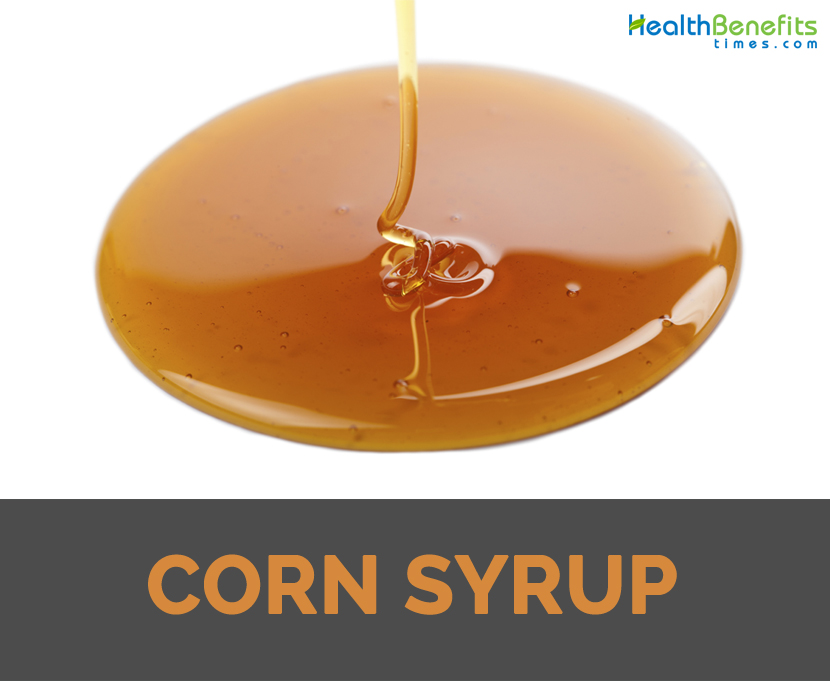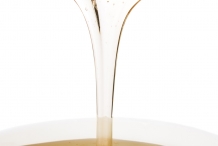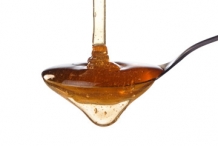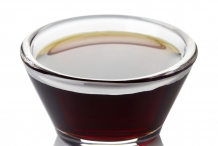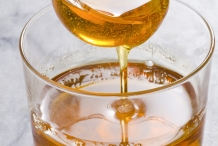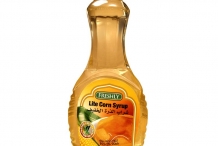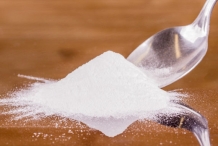It is food syrup which is made from corn starch known as maize in some countries and possess various amounts of maltose and higher oligosaccharides that depends on grade. Corn syrup is also called glucose syrup to confectioners and used in foods for softening texture, prevent sugar crystallization, add volume and promote flavor. This sweet syrup is formed by breaking down cornstarch either by combining it with enzymes or heating it with dilute acid. Sometimes, corn syrup is also known as glucose syrup which is also made from hydrolysis of starch but not cornstarch necessarily; potatoes, wheat, other plants and rice may serve as starch sources.
Light corn syrup is clarified or decolorized and used in jams, baked goods, jellies or other food products. When heated, it does not crystallize and is used as an ingredient in candies. Dark corn syrup is prepared by mixing corn syrup with molasses and caramel coloring and tastes sweeter than light ones. Its use is similar to darker ones and due to its distinctive flavor; it is used as table syrup. This syrup is used for producing high fructose corn syrup in which glucose is turned to fructose with an addition of enzyme named D-xylose isomerase. High fructose corn syrup is used in food industry for making soft drinks as it is cheaper than sucrose.
How to Eat
- Use it in cookies, catsup, crackers, flavored yogurts, cereals, preserve meats, ice cream, soups, vegetables, canned fruits and beers.
- Add it to salad dressings, bread and crackers.
- It is used to enhance flavor in dairy products, beverages and bakery fillings.
- Use it in making jams and jellies.
- It provides soft and moist texture to snack bars, chewy cookies and other baked goods.
- It provides flavor and imparts browning to breakfast cereals, cakes and cookies.
- Corn syrup is used as a sweetening ingredient in frostings.
- It is also used to make rice crispies, nutritional bars, caramel snack mixes, sorbets and ice creams.
- Use it as an ingredient in fudges, chocolates and biscuits.
Side effects of corn syrup
Various health issues could be resulted from too much consumption of Corn syrup. Here are few of the potential side effects:-
- Type 2 diabetes
High fructose is similar to traditional sugar and could lead to type 2 diabetes. Type 2 diabetes is caused due to the body becoming insulin resistant because of the presence of overload of glucose in bloodstream. There are treatments for type 2 diabetes but could not be cured completely. Its symptoms are tiredness, blurred vision, heart attack and kidney disease.
- Heart disease
Too much sugar or corn syrup could cause cardiovascular problems. The organs can’t keep and it puts significant stress on bodily functions. The studies show that people who consume 17-25% of daily calories from sugar have higher risk of death from cardiovascular problems. Cut down this ingredient to the diet for increasing life expectancy.
- Obesity
Obesity is the major problem in both children as well as adults. It could be prevented by changing diet and lifestyle. As sweets are addictive, we rely on them for satisfying cravings and regulating mood. This ingredient is not limited to desserts but also savory foods. So make changes to diet as well as exercise patterns.
- Dementia
Excess sugar can affect the brain and obstructs memory that could be detrimental over longer time period. The creation of insulin resistance by the body even promotes the chances of Alzheimer’s disease. The rise in blood sugar could cause inflammation in the body. The body requires fresh and organic ingredients to maintain the functions of the body and mind.
- Liver failure
Liver is responsible for processing various drinks and foods and when it could not keep up, it could go into meltdown. This results in liver failure. With sedentary lifestyle, it could cause permanent liver scarring. It reduces the ability of the organ to process out toxins and results in various other negative health concerns.
Storage
- Store it in tightly sealed containers in the refrigerator or at room temperature.
- With age, light corn syrup turns slightly yellow but is not harmful.
References:
https://www.rippehealth.com/publishing/papers/CRA-Roundtable-Foreyt.pdf
https://en.wikipedia.org/wiki/Corn_syrup
https://www.britannica.com/topic/corn-syrup
http://www.starkelnutrition.com/2017/many-names-high-fructose-corn-syrup/
https://www.foodinsight.org/Content/3862/HFCS%20FACT%20SHEET%20-%20FINAL.pdf
https://www.elevationgourmet.com/blogs/healthy-eating/uncovering-high-fructose-corn-syrup
http://www.karosyrup.com/faq.html
https://www.globalhealingcenter.com/natural-health/high-fructose-corn-syrup-dangers/
https://draxe.com/high-fructose-corn-syrup-dangers/
https://www.tarladalal.com/glossary-corn-syrup-1485i
Comments
comments
| Corn Syrup Quick Facts | |
|---|---|
| Name: | Corn Syrup |
| Flesh colors | Light/dark |
| Calories | 62 Kcal./cup |
| Major nutrients | Carbohydrate (12.99%) Vitamin B1 (1.08%) Sodium (0.93%) Zinc (0.91%) Selenium (0.36%) |
